Official MKN SOP For Klang Valley Phase 2 Of PPN As Of 25 August (In English)
Phase 2 in Klang Valley starts on 10 September.
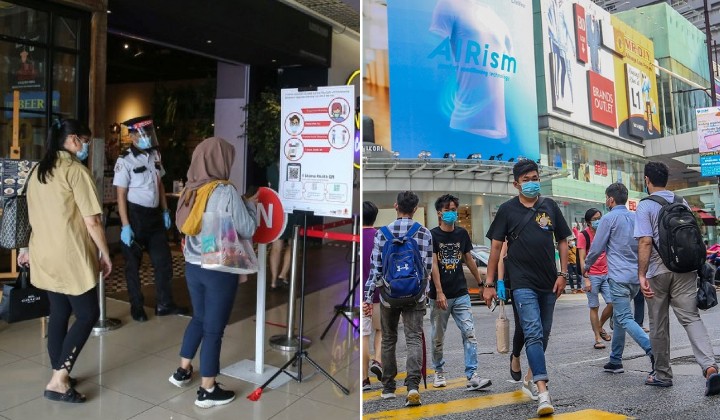
Subscribe to our new Telegram channel for the latest updates and stories.
For your convenience, TRP took the liberty of translating the latest Phase 2 standard operating procedures (SOP) for the National Recovery Program (PPN) released by the National Security Council (MKN) on 25 August, which came into effect on 20 August 2021 for some states.
Do note that the latest additions in the SOP are highlighted in green.
TLDR: Inter-district travel is allowed, but you have to be fully vaccinated.
Areas Involved
KELANTAN, TERENGGANU, PAHANG, PERAK, PENANG, SABAH, MELAKA, SELANGOR, W.P. KUALA LUMPUR AND W.P. PUTRAJAYA.
*For Sabah, please refer to the National Rehabilitation Plan – Sabah Phase 2 SOP.
** For areas enforced by EMCO, EMCO SOP in the area is effective until the expiry date of the EMCO.
Effective Period
- Starting August 20, 2021 (starting at 12.01 am)
- For Melaka starting on 4 September 2021 (starting 12.01 am)
- For Selangor, W.P. Kuala Lumpur and W.P. Putrajaya starts on 10 September 2021 (starting 12.01 am)
Fully vaccinated
Individuals who have been completely vaccinated are those who’ve met the following criteria:
i. For vaccine types that require two doses of injection (such as Cormirnaty (Pfizer-BioNTech), Covid-19 AstraZeneca (Oxford-AstraZeneca), CoronaVac (Sinovac), Spikevax (Moderna) and Covilo (Sinopharm)) – individuals exceeding the 14th day from the date of injection of the second dose; or
ii. For types of vaccines that require only one injection dose (such as Covid 19 Janssen (Johnson & Johnson) and Convidecia (CanSino)) – exceeding the 28th day from the date of injection.
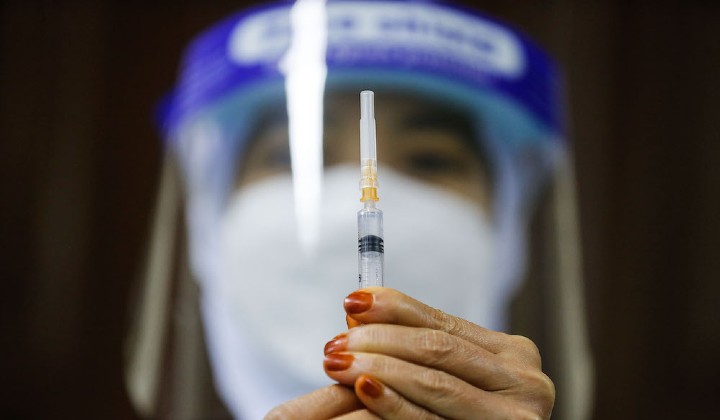
General Health Protocols
- Premise owners and licensees must ensure customers enter and exit a premise in a controlled manner and maintain physical distancing of at least 1-meter.
- Premise owners and licensees must provide QR code for MySejahtera check-ins or a book for manual customer attendance record.
- Hand sanitisers must be provided at the entrance and must be used before entering the premises.
- The use of the MySejahtera app is a must, except in places with no internet access.
- The use of customer attendance registration books is only allowed in areas where there is no internet coverage or other reasonable reasons (senior citizens, absence of smartphones etc.)
- Licensee and owner of the premises ensure that customers check in the premises using MySejahtera or manually write the name and no. phone if there is no internet coverage.
- Employers, employees, customers and visitors are required to check in MySejahtera or write manually the name and phone number that can be read (if there is no internet coverage) before entering the premises, including in Government offices, private and private.
- For shopping malls, supermarkets or department stores, customers only need to perform a body temperature scan once at the entrance of the complex and not at each business premises under one complex.
- Body temperatures above 37.5 degrees Celsius are not allowed to enter the complex and premises.
- Storeowners inside or outside a complex must ensure that only individuals with ‘Low-risk’ and ‘Casual Contact Low Risk’ status in their My Sejahtera app are allowed to enter the premises.
- Children aged 17 and below are not encouraged to be at public areas and facilities.
- Licensee and owner of the premises must limit the number of customers/visitors on premises – taking into account the minimum 1-meter physical distancing rule.
- Each premises must display the number of customers/visitors allowed into the premises at a single time. Using a ‘take-a-number’ system is encouraged.
- Check-in QR codes must be made available at all levels of the building.
- Employees, suppliers, and customers must wear face masks properly, according to Health Ministry (KKM) guidelines, while on-premises.
- Esure the VENTILATION AND THE VENTILATION SYSTEMS at the premises is in working order, in accordance to the indoor ventilation and air quality guidelines put out by the Department Of Occupational Safety and Health (JKKP).
- A face mask must must be worn especially in public and crowded areas, except for the following activities and places;
- Hotel rooms or private paid accommodations and involving household/family members.
- Solitary work space.
- Outdoor sports and recreational activities.
- Personal vehicle and involving members of the same household.
- Indoor or outdoor public areas and places without the presence of other individuals.
- While eating and drinking in public without any other individuals (other than in restaurants or food premises).

Perks For Fully Vaccinated Individuals
Inter-district travel
Cross-district is allowed for individuals who have completed receiving the vaccine by presenting the COVID-19 Vaccination Digital Card/ Certificate and identity card/ passport as proof.
For individuals who have received a complete vaccination are allowed to bring children aged 17 years and below in compliance with general health protocols.
Crossing State & District Lines For Long Distance Couples (PJJ)
- Married long distance couples are allowed to cross district and state lines for the purposes of meeting each other on the condition that both individuals are fully vaccinated, have PDRM’s approval, and these documents:
- Copy of the husband and wife’s identification card.
- Copy of wedding certificate/card.
- Copy of the husband and wife’s Covid-19 Vaccination card or Digital Certificate.
- Copy of proof of spouse’s residence or employer confirmation letter.
- Present the letter of permission that had been approved by PDRM when passing through roadblocks (SJR).
Crossing State & District Lines For Parents And Guardians With Long Distance Child (Under 18)
- Parents or guardians with children under the age of 18 that resides in a different district or state are allowed to cross district and state lines to meet the child on the condition that both parents/guardians are fully vaccinated, have PDRM’s approval, and these documents:
- Copy of parents’ identification card and child’s birth certificate.
- Copy of parents’ / guardian’s Covid-19 Vaccination Card or Digital Certificate.
- Information about the child’s school (if applicable)
- Present the letter of permission that had been approved by PDRM when passing through roadblocks (SJR).
Citizens & Non-Citizens Returning / Arriving From Abroad
- Citizen and non-citizen travelers, who have a residence in Malaysia (including PR and Malaysia MY Second Home), who returned or arrived from abroad, and are fully vaccinated, are allowed to undergo mandatory quarantine at home and given a Home Surveillance Order (HSO) that is subject to details issued by the Ministry of Health (MOH).
- Provide a valid proof of a negative RT PCR test result taken within three days before departure.
- Have a valid Covid-19 Vaccination Certificate that is complete (depending on type of vaccine).
- Shows no symptoms during screening at the International Gateway.
- Have a suitable residence to carry out quarantine.
- Individuals who return / arrive from abroad and have not been fully vaccinated or not vaccinated, must to undergo quarantine at a designated quarantine center as well as subject to details issued by the MOH.
- The mandatory quarantine period for travelers from all countries is 14 days and can be extended for another 7 days if there is a need based on the results of the risk assessment conducted on the 14th day.
- Travelers are required to make a self -assessment every day through the Home Assessment Tool (HAT) in the MySejahtera application and this activity must be continued until the end of the quarantine period (either 14 days or 21 days from the date of arrival).
- Travelers are required to undergo Covid-19 infection detection test screening i.e. Covid-19 RT-PCR test upon arrival at PMA. Repeat screenings will be performed on the 10th or 18th day (for travelers who had to undergo quarantine for 21 days).
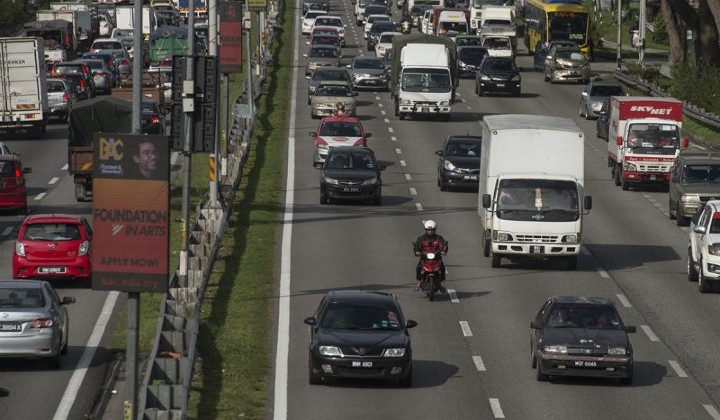
Religious Activities
- Prayer activities in mosques and suraus for individuals who have been fully vaccinated are allowed and is subject to regulations and SOPs by the State Religious Authority.
- Prayer activities at Houses of Worship Other than Islam (RISI) for individuals who have been fully vaccinated is allowed and is subject to regulations and SOPs by the Ministry of National Unity.
Dine-in
Restaurant operators including hotels, sports and recreation club houses, eateries, food stalls, catering vehicles, roadside hawkers, street hawkers, food courts, hawker centers, roadside food stalls and kiosks are allowed to provide dine in services subject to the following conditions :
- Only accept clients who have been fully vaccinated and do not have any symptoms
- The owner of the business premises MUST display the customer’s acceptance notice
- have been completely vaccinated and asymptomatic only at the entrance of the premises.
- Employees who have received a complete dose of vaccine and do not have symptoms are only allowed to work with the following vaccination rates:
- 40% vaccinated: Allowed to operate with a capacity of 60% of employees.
- 60% vaccinated: Allowed to operate with a capacity of 80% of employees.
- 80% vaccinated: Allowed to operate with 100% employee capacity.
- The owner of the business premises must ensure that the table layout according to the prison and the premises have a good ventilation system.
- Dine-in activities with a capacity of 50% per table and physical distancing of at least 1 meter subject to KPDNHEP NRP Phase 1 – Distribution Trade SOP.
- Individuals who have received a complete vaccination are allowed to bring children aged 17 and under to dine-in at the premises in compliance with general health protocols.
Sports & Leisure
Dine-in activities in restaurants or cafes on the club house premises are permitted.
Picnics and Camping
- Picnics and camping activities are allowed in the same district.
- Individuals who have completed their vaccinations are allowed to bring children 17 years of age and under for the activity in strict compliance with SOPs.
Tourism activities
- Tourism activities are only allowed in the same state involving hotels and homestays.
- Guests who have been fully vaccinated are allowed to undertake tourism activities in the same state by presenting the Covid-19 Digital Vaccination Card/Certificate upon check-in.
- Hotel and homestay operators must ensure that individuals wishing to enter the premises MUST show a COVID-19 Digital Vaccination Card/ Certificate proving the individual has been fully vaccinated.
- Individuals who have received a complete vaccination are allowed to bring children aged 17 years and below for tourism activities in hotels and homestays in accordance with general health protocols.
Manufacturing and Construction sectors
- For activities not listed in the List of Essential Services of the Manufacturing and Construction Sector that achieve a complete vaccination rate for employees are allowed to operate as follows:
- 40% vaccinated: Allowed to operate with a capacity of 60% of employees
- 60% vaccinated : Allowed to operate with a capacity of 80% of employees
- 80% vaccinated : Allowed to operate with 100% employee capacity
- RTK Antigen testing on employees is carried out every 2 weeks at the cost of the employer.
Mining and Quarrying
- For the mining and quarrying sector that has achieved complete vaccination rates for workers are allowed to operate as follows:
- Less than 80% vaccinated: Allowed to operate with 80% employee capacity
- More than 80% vaccinated: Allowed to operate with more than 80% capacity
- RTK Antigen testing on employees is carried out every 2 weeks at the cost of the employer.
Trade and Distribution Sector
- Photographic goods store and photographic services
- Used goods store
- Flower shop and nursery
- Handicraft and souvenir shop
- Antique shop
- Toy store
- Carpet store
- Creative content store and creative industry equipment
- Outdoor equipment store (including camping, fishing equipment, etc.)
- Cosmetics, skin care and perfume stores
- Tobacco stores (including vape and electronic cigarettes)
- Store of household goods and kitchen utensils
- Furniture store
- Sports equipment store
- Vehicle accessories store
- Vehicle distribution and sales center
- Clothing, fashion and accessory stores
- Jewelry store
- Premise owners must ensure that customers wishing to enter the premises MUST show a Covid-19 Digital Vaccination Card/ Certificate proving that the customer has been fully vaccinated.
- For parents/ guardians who have received a complete vaccination are allowed to bring children aged 17 years and below to the premises in accordance with general health protocols.
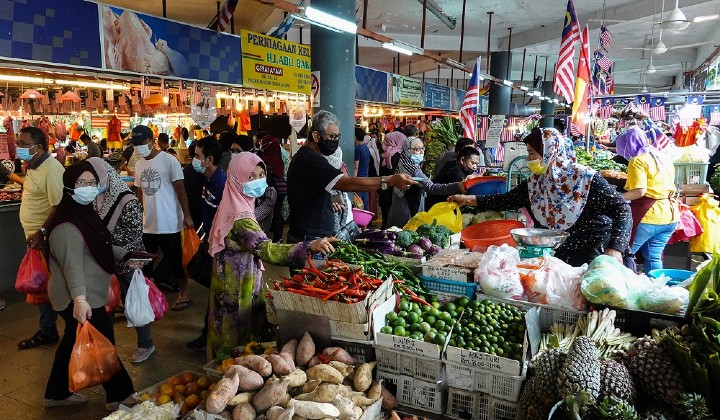
Morning Market, Farmers Market, Night Market and Sunday Market
- Customers who receive this facility must have received a complete vaccination.
- Morning markets, farmers’ markets, night markets and weekly markets are allowed to operate by ensuring that customers who wish to enter the morning market, farmers’ market, night market and week market area MUST show their Covid-19 Vaccination Digital Card/Certificate which proves the customer has been fully vaccinated.
Movement and Travel
- No inter-district and inter-state travel allowed (based on district boundaries specified by State Governments) except for:
- Individuals who have been fully vaccinated for cross-district purposes only.
- long distance couples, long distance children, and individuals with approval from KKM and PDRM.
- PDRM is responsible for implementing control over local areas of infection with help from the Malaysian Armed Forces (ATM), the Malaysian Civil Defence Force (APM), and the People’s Volunteer Corps (RELA). Entrances and exits to PPN areas are closed and guarded by PDRM.
- Movement for individuals who have been fully vaccinated is allowed based on the total capacity of the vehicle.
- Meanwhile, for those who have not received a complete vaccine:
- Only two (2) people from each household is allowed to go out in order to obtain food, necessary supplies, and medicine.
- A maximum of three (3) people – including patients – are allowed to go out in order to acquire healthcare services, medical, screening tests, vaccinations, safety, or emergencies.
- Only two (2) people – including the driver – are allowed in taxis and e-hailing rides. Passengers must be seated in the back seat.
- The number of passengers allowed to travel in commercial vehicles and transportation involved in the economic supply chain (except worker transports like busses and vans) will depend on the vehicle registration license.
- The number of passengers allowed in Department Vehicles or Official Government vehicles will depend on vehicle capacity.
- All airports and seaports services and activities are allowed to operate 24 hours a day.
- Loading and unloading of non-essential items at factories will only be allowed for the purpose of shipping and receiving goods or cargo in stockpiles for imports and exports from 8 am to 8 pm on Mondays, Wednesdays, and Fridays, and with only a limited number of workers allowed to be present.
- The loading and unloading of essential goods are not limited by the rules (above) and can operate as normal.
- Sea and land public transport services such as ferries, busses, express busses, LRT, MRT, ERL, Monorail and others are allowed to operate based on vehicle capacity. (operational hours and frequency are to be determined by the Transport Ministry (MOT)).
- Travel in cases of death, natural disasters and other emergencies are allowed with prior permission from PDRM.
- Travel for disaster or humanitarian aid and relief by non-governmental organizations (NGO) must obtain the permission of the State Disaster Management Committee (JPBN) or District Disaster Management Committee (JPBD) of the affected area. The aid must be channelled through the Disaster Operations Control Center (PKOB) in the area.
- Travelling across district and state borders for Covid-19 vaccinations at Vaccination Centers (PPV) outside of your district/state of residence is allowed by presenting your appointment details provided on the MySejahtera application, website or text message (SMS).
- Members of Parliament (MP) and Assemblymen (ADUN) are allowed to travel across district and state borders in order to visit their constituents without organizing a formal event.
- Short-term business traveller under the One-Stop Center (OSC) initiative is allowed with prior permission from PDRM.
.jpg)
Movement Control
- Unloading activities involve non -essential goods in factories – factories are limited to the delivery and receipt of goods or cargo in the existing stockpile for the purpose of import and export only with a limited number of employees. Unloading time is from 8.00 am to 8.00 pm on Monday, Wednesday and Friday with the permission of PDRM.
- Unloading activities involving essential items are not subject to these restrictions and proceed as usual.
- Movement for cases of death and natural disasters is allowed after obtaining permission from PDRM.
- The movement of disaster or humanitarian aid by NGOs needs to obtain permission from the State Disaster Management Committee or District Disaster Management Committee in the area affected by the disaster and the aid is channeled through the Disaster Operations Control Center (PKOB) in the area.
- Movement across districts and states for the purpose of COVID-19 vaccination at Vaccination Centers (PPVs) outside the district or state of residence is permitted by showing appointment details on the MySejahtera application, website or SMS.
- Members of Parliament and State Assemblymen are allowed across districts and states to visit their respective constituencies without performing any ceremony.
- Movement of Short Term Business Visitors under the approval of the One Stop Center Initiative (OSC) for official or business purposes is allowed after obtaining permission from PDRM.
- Cross-district and state for long-distance married couples who have not received a complete vaccine is allowed between Phase 2 states with the permission of PDRM and submit;
- Copy of husband and wife’s identity card
- Copy of marriage certificate/ card
- Copy of proof of residence of husband/ wife or employer’s confirmation letter.
Jobs
Public Sector
- Subject to the discretion of the Secretary of State.
- The operation of Government offices is implemented in a hybrid manner through being in the office and Working From Home (BDR) using the following approaches:
- Attendance in office does not exceed 60% for the whole (excluding frontliners, security, defense and enforcement services) and 40% BDR by rotation.
- Counter services are opened subject to the current instructions of the Chief Secretary to the Government.
- Attendance to the office must be accompanied by official instruction documents and employee pass.
Private sector
- All service sectors that have been approved by associated Ministries or Agencies may operate within the PPN period – subject to the approval letters issued by the associated Ministry. Employee movement is subjected to registrations, operation approval letter, work pass, or employer confirmation letter.
- The capacity of employees in attendance (to the workplace) for the private service sector, including management and operations, is limited to 80%.
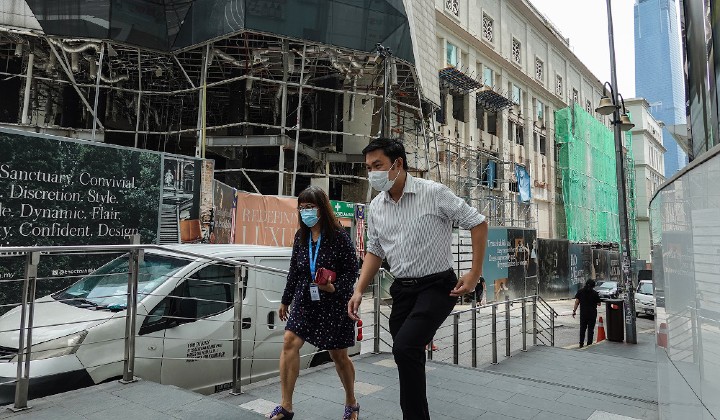
Meetings
- All meetings must be conducted online.
Seminars, Workshops, Courses, Training, & Lectures
- Seminars, talks, training, courses, and workshops are not allowed, except, ongoing in-service training programs – conducted via Camp Based Training at the training facilities.
- Online seminars, talks, training courses and workshops are allowed.
- Interviews that are critical may be conducted in person and online.
Businesses & Services
- Restaurants, eateries, food stalls, food trucks, roadside hawkers, travelling hawkers, food courts, hawker centres, roadside food stalls or kiosks are allowed to operate between 6 am and 10 pm.
- Customers can only takeaway, drive-thru, or deliveries EXCEPT dine-in services for those who’ve completed their vaccinations.
- Park & dine services are not allowed.
- Grocery shops, pharmacies, personal care stores, convenience stores, and mini marts, are allowed to operate between 6:00 am and 10:00 pm.
- Daily necessities stores such as hardware stores, workshops, baby goods stores, and religious item stores are allowed to operate between 6:00 am to 10:00 pm.
- Healthcare services such as clinics, hospitals, and medical laboratories can operate for up to 24-hours or according to operating permit license.
- Petrol stations can operate from 6:00 am to 10:00 pm. Stations located on highways can operate for 24-hours.
- Supermarkets, hypermarkets, and departmental stores may open from 6:00 am to 10:00 pm.
- Books and stationery shops, computer and telecommunications stores, and electrical appliances shops are allowed to operate from 6:00 am to 10:00 pm.
- Barber shops (basic barber services only) and beauty salons (basic barber services only) are allowed to operate from 6.00 am to 10.00 pm
- Veterinarian clinics and pet shops are allowed to operate from 6:00 am to 10:00 pm.
- Laundromats (including self-service) and optical stores are allowed to operate from 6:00 am to 10:00 pm. Self-service laundromats must have employees at premises to maintain SOP compliance.
Markets
- Daily markets and public markets are allowed to operate from 6 am and 4 pm with permission from Local Authorities (PBT) with compliance to SOP and supervision from RELA or PBTs.
- Regulated Fresh Markets (PST) are allowed to operate from 7 am to 2 pm.
- Permanent Farmers’ Market (PTK), MyFarm Outlet (MFO), and Farmer Association Complex (PPK) are allowed to operate from 6 am to 4 pm.
- Wholesale markets are allowed to operate from 12.01 am to 6 am and 11 am to 4 pm – subject to permission from PBT with compliance to SOP and supervision from RELA and PBTs.
- Day markets and farmers’ markets are allowed to operate from 7am to 11am.
- Night markets and week markets are allowed to operate subject to the local authorities (PBT) with compliance with SOPs and supervision of RELA or PBT members.
- Customers wishing to enter the morning market, farmers market, night market and week market areas MUST show a Covid-19 Digital Vaccination Card/ Certificate proving that the customer has been fully vaccinated.

Mining and Quarrying
- The operation of mines and quarries is permitted subject to the Mining and Quarrying SOPs.
Agriculture, Fisheries, Livestock, Plantations, & Commodities
- Subject to the List of Essential Services by Sector – Agriculture, Fisheries, Livestock, Plantations, and Commodities allowed.
- Fishing for subsistence is ALLOWED.
Education
- All schools under KPM and educational institutions registered under KPM are open to conduct face -to -face PdP sessions limited to Form Six Semester 2 students only.
- Form Six Semester 2 students are allowed across districts and states to go to school using a confirmation letter from the MOE.
- The movement of Form Six Semester 2 students to and from school can be accompanied by a guardian.
- The movement of teachers or instructors to schools/educational institutions to cross districts and states for the purpose of PdP of the classes involved in the examination is allowed with a letter of confirmation from the MOE.
- Movement for the admission of Form Six Semester 2 students to the hostel is allowed with a letter of confirmation from the MOE.
- Form Six Semester 2 students who cross the state from Peninsular Malaysia to Sabah, Sarawak and the Federal Territory of Labuan or otherwise must comply with the rules related to Covid-19 screening and quarantine implemented.
- Pupils/Students of international schools and expatriate schools involved in international examinations are allowed to attend to sit for the examination according to the examination schedule set by the international examination body.
- All Public and Private Institutes of Higher Learning, Skills Training Institutes, schools other than under the MOE, tahfiz centers and other educational institutions were closed. HEIs under the supervision of MOHE continue online.
- All face-to-face Teaching and Learning (PdP) activities are not allowed except for IPT students who need it.
- International examinations and professional bodies as well as research activities that require laboratory facilities in IPTs are allowed in accordance with the SOPs of the IPTs and the movement must be accompanied by confirmation by the Ministry of Higher Education (MOHE) or related IPT.
- Students in dormitories, universities or educational institutions are allowed to be in such dormitories, universities or educational institutions and continue learning in a hybrid manner.
Kindergartens, Nurseries, Daycares, & Nursing Facilities
- Local/international/expatriate, public or private kindergarten, tabika, taska, daycare, and child development centres for 4 to 6 year-olds are not allowed to operate, except, if both of the child’s parents are frontliners and work in essential services.
- Residential care centres or rehabilitation centres for children, people with disabilities (OKU), seniors, women, and various other care centres are ALLOWED to operate in accordance with the SOP determined by associated Ministries and Agencies.
- Parents or guardians who send children to childcare centers are allowed according to the capacity of the vehicle.
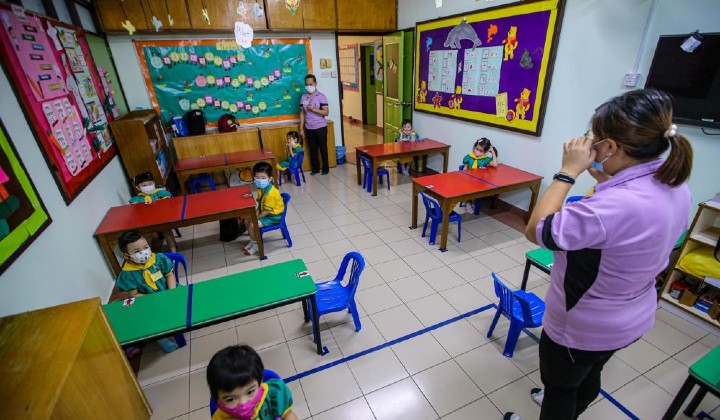
Religious Activities
- Muslim prayer activities at mosques and ‘suraus’ are allowed for those who are fully vaccinated.
- ‘Akad Nikah’ or solemnization are allowed to take place at the State Religious Authority/Department offices – attendance will be determined by each respective state’s religious authority.
- Muslim funeral processions are allowed according to regulations provided by State Religious Authority.
- Attendance and activities at non-Muslim places of worship are allowed for those who are fully vaccinated is subject to regulations and SOP by the Ministry of National Unity.
- Marriage registrations for non-Muslims at the National Registration Department (JPN), places of worship, and religious associations are allowed – attendance is subjected to regulations made by JPN.Funeral processions for non-Muslims are allowed with regulations set by the National Unity Ministry (KPN).
- Non-muslim funeral management is allowed in accordance with the KPN’s ruling.
Sports & Leisure activities
- All individual sports and recreational activities that are not in physical contact for the purpose of health, fitness and self-skills by complying with a physical confinement of at least 2 to 3 meters and performed in open areas (outdoor) including semi-open from 6.00 am to 10.00 pm subject to the movement control instructions. Such activities are jogging, exercise, swimming, kayaking (solo), taichi, cycling, skateboarding, fishing, equestrian, archery, climbing, tennis/ badminton (singles), golf, motoring and the like.
- Operation of all open (outdoor) and semi-open commercial sports and recreation facilities including swimming pools/water sports & recreation premises (open/semi -open) with compliance to 60% utilization capacity/area WITH supervisory control. Employee attendance is not more than 60% of the workforce covering management and operations.
- The operation of all open (outdoor) and semi -open commercial sports and recreation facilities including public swimming pools/sports & water recreation premises (open/semi-open) is subject to the Local Authority (PBT)
- The operation of all indoor sports and recreation facilities is RESTRICTED for necessary management purposes (finance, maintenance and the like) only with compliance not exceeding 30% of the workforce including management and operations.
- Centralized training programs including tournaments or quarantined closed matches conducted by the National Sports Council (MSN) will be conducted via Camp Based Learning.
- Centralized quarantined training programs conducted by State Sports Councils will be conducted via Camp Based Learning.
- Quarantine-based training program for teams in the Malaysian Football League (MFL) using the Camp Based Training model.
- The participation of Malaysian athletes/coaches/officials/ technicians to tournaments or competitions or matches abroad is SUBJECT to the approval of the Malaysian Immigration Department (JIM) WITH the support of KBS/ MSN.
Creative industry
- Development and broadcasting of creative content by recording or live broadcast including animation, filming, drama, promotion, sitcoms and the like, including dance activities, theater arts, musical arts, cultural performances and heritage as well as the art of music are not allowed except for individual talk and live streaming.
- Recorded broadcasts or live broadcasts of programs in the form of information delivery (other than entertainment) such as news, forums, talks are allowed.
- Filming outside the studio (outdoor) is allowed with strict compliance with SOPs issued by the Malaysian National Film Development Corporation (FINAS).
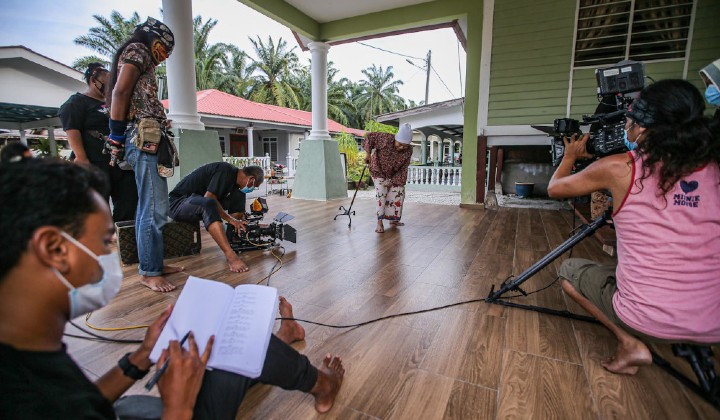
Other Activities
Picnic and camping activities for individuals who have not been fully vaccinated are not permitted.
List Of Essential Services Allowed To Operate
- Food and beverages (including animal feed).
- Health and medical care including dietary supplements, care products as well as veterinary clinics and services.
- Water.
- Energy.
- Security (security and safety), defence, emergency, welfare, and humanitarian aid.
- Solid waste management, public cleaning/sanitation and sewerage.
- Transportation by land, water, or air.
- Port, shipyard, and airport services and operations, including loading, cargo handling and piloting, and the storage or packing of commodities.
- Communications including media, telecommunications, and internet, post and courier services as well as broadcasting (for the purposes of news and alike).
- Banking, insurance, takaful, and capital markets.
- Pawnshops and community credit facilities.
- E-commerce and information technology.
- Production, distillation, storage, supply, and distribution of fuels and lubricants.
- Hotels and accommodation.
- Construction.
- Forestry and wildlife services (limited to enforcement).
- Legislation and the judiciary.
- Lawyers and commissioners of oaths.
- Accounting services.
- Professional services and consultants (subject to professional body regulatory authority)
- Logistics limited to delivering necessary services
List Of Essential Services By Sector
Production (worker capacity 80%)
- Aerospace (components and maintenance, repair and overhaul – MRO).
- Food and beverages.
- Packaging and printing materials related to essential services sector.
- Personal care items and detergents.
- Health care and medical products.
- Personal care items, personal protective equipment (PPE) including rubber gloves and fire safety equipment.
- Components for medical devices.
- Electrical and electronics (crucial to the global economic chain).
- Oil and gas including petrochemicals and petrochemical products.
- Machinery and equipment.
- Textiles for PPE production.
- Production, distillation, storage, supply and distribution of fuels and lubricants.
- Automotive (vehicles and components)
- Ceramic
- Cement
- Rubber
- Iron
- Steel
- Furniture factory for export purposes
Agriculture, Fisheries, Livestock, Plantation and Commodities (Optimal Capacity)
- Agriculture, fisheries and livestock and their chains.
- Plantations and commodities and their chains (oil palm, rubber, pepper, cocoa, timber, kenaf, biodiesel and agricultural commodity certification)
- Small-scale logging activities are subject to the SOP of the Ministry of Energy and Natural Resources (KeTSA)
Construction
- Maintenance and repair works.
- Public infrastructure construction works.
- Construction work works that have the accommodation of approved workers on the construction site.
- Construction works placing workers in approved Centralized Workers Quarters (CLQ).
- Construction works carried out by contractors G1, G2, G3 or G4.
- Renovation works for individual residential houses / buildings.
- Land survey work.
- Government Funded Project construction works.
- Professional services/ consultants involved with the construction sector
10.Services in the supply chain involved for construction works allowed to operate. - Site preparation works such as land surveying, earthworks, marking and site clearing.
- Road and highway construction works.
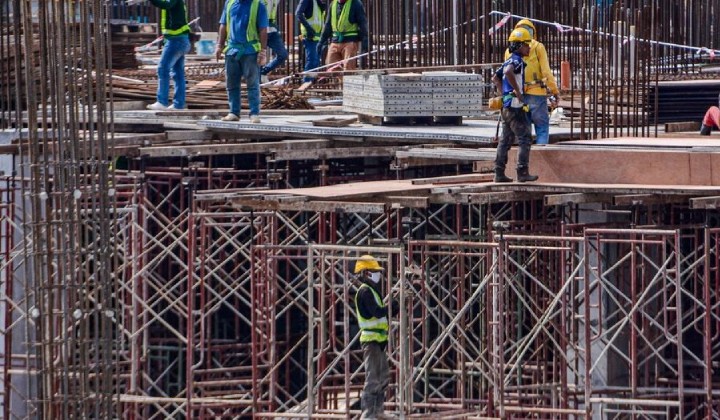
Distribution Trade
Without Vaccine Requirements
- Shopping complexes INCLUDING supermarkets, hypermarkets and departmental stores AND all necessary services are listed
- Supermarkets and hypermarkets
- Departmental stores
- Pharmacy, personal care, convenience store and mini mart
- Restaurants
- Laundry (including self -service)
- Pet care and pet food stores
- Shop for spectacles and optical goods
- Hardware store
- E-commerce (all product categories)
- Wholesale and distribution (all categories of necessary service products only)
- Book and stationery stores
- Computer and telecommunication stores
- Electrical goods stores
- Barber shop (basic barber service only)
- Beauty center/ salon (basic barber service only)
- Vehicle wash shops
- Vehicle workshop, maintenance and spare parts
- Other Specialty Retail Stores (gas stations)
Full vaccination required
- Photographic goods store and photographic services
- Used goods store
- Flower shop and nursery
- Handicraft and souvenir shop
- Antique shop
- Toy store
- Carpet store
- Creative content store and creative industry equipment
- Outdoor equipment store (including camping, fishing equipment, etc.)
- Cosmetics, skin care and perfume stores
- Tobacco stores (including vape and electronic cigarettes)
- Household goods and kitchen equipment store
- Furniture stores
- Sports equipment store
- Vehicle accessories store
- Vehicle distribution and sales center
- Clothing, fashion and accessories store
- Jewelry store
Others
Such services, works, industries and businesses as may be determined by the Government after consultation with the authorities regulating such services, works, industries and businesses.
ANY ACTIVITIES NOT LISTED IN THE LATEST SOP ARE NOT PERMITTED.
Negative List – prohibited activities
Economic activities
- Spas, reflexology centres, massage centres, wellness centres, as well as manicure and pedicure services.
- Cyber cafes and internet centres.
- Driving school/centre, maritime, and aviation training centres.
- Photography.
- Casinos, horse race tracks, and lottery centres.
- Alcohol breweries and liquor stores.
Social activities
- Formal or informal, governments or public sector events.
- Social events such as; ‘kenduri’ or feasts, festive celebrations, engagement parties, wedding receptions, Aqiqah, Tahlil, and ‘doa selamat’ events, anniversaries, birthdays, reunions, retreats, and other social gatherings.
- Having guests or visitors at one’s residence, except, in cases of emergencies or for item deliveries.
- Face-to-face seminars, workshops, courses, training, conferences, talks, exhibitions and meetings, incentives, conventions and exhibitions (MICE).
Tourism and cultural activities
- Public tourist attractions such as; zoos, farms, aquariums, edutainment centres, extreme, adventure, nature parks, and others.
- Art, cultural and heritage centres such as; museums, libraries, art galleries or cultural heritage villages, performance stages, and others.
- Theme parks, family entertainment centres, indoor playgrounds and karaoke places.
- Tourism activities across district or state boundaries.
- Cross-district tourism activities for individuals who have not been fully vaccinated.
- International and domestic tourism activities by locals and domestic tourism activities involving foreigners entering Malaysia.
Sports & recreation activities
- All team and contact sports and recreational activities.
- All indoor sports and recreational activities.
- The attendance of an audience or supporters at a sports or recreational venue.
- Organizing local and international tournaments or competitions or matches EXCEPT indoor or indoor competitions / tournaments organized by MSN and league matches of teams under MFL.
- Sports and recreational activities conducted outside of or across PPN enforcement areas, EXCEPT with permission from PDRM.
Creative industry
- Performances at hotel lounges.
- Indoor or outdoor busking (except at PPVs).
- Activities at nightclubs or pub.
- Activities at the cinema.
- Indoor filming.
Other prohibited activities
- Any activities that causes mass gatherings, that can hinder physical distancing and compliance with orders by the Health Department Director.
- Other matters will be determined by the government from time to time.
Share your thoughts with us via TRP’s Facebook, Twitter, and Instagram.
Unkempt in both stories and appearance, Hakim loves tech but tech left him on read, previously he used to write about tall buildings and unoccupied spaces that he can't afford, and legend has it that he still can't afford it to this day

